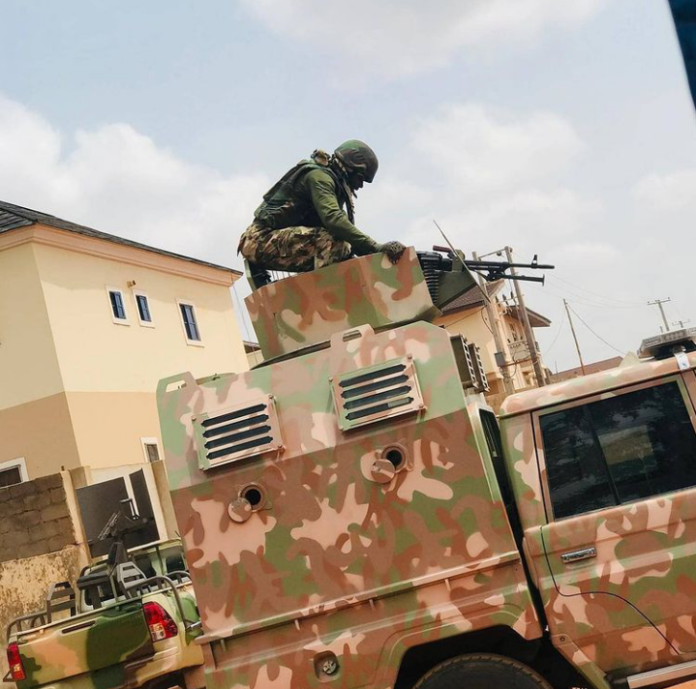Nigeria’s Armed Forces have suffered another setback in their global military ranking, falling three places to 39th out of 145 countries in the 2024 Global Firepower (GFP) assessment. This marks a worrying trend for Nigeria, as the nation’s ranking has consistently declined since placing 35th in 2022 and 36th in 2023.
On the African continent, Nigeria has dropped to fourth position, ceding ground to South Africa, which now sits in third. Egypt retained its position as Africa’s strongest military power, followed by Algeria. Ethiopia, Angola, Morocco, and the Democratic Republic of Congo also featured prominently among the continent’s military powers.
Global Trends
Globally, the United States maintained its dominance for the 18th consecutive year. “America’s unmatched financial resources, advanced technological capabilities, and logistical reach have solidified its first-place position,” the GFP report noted. Russia, China, India, and South Korea completed the top five, with each benefiting from robust investments in modernizing their armed forces and extensive manpower reserves.
Nigeria’s Challenges
Nigeria’s decline is particularly puzzling considering its recent investments in defense procurement. The country has acquired fighter jets, armored vehicles, and other advanced military hardware aimed at countering terrorism and insurgency. In recent years, the Nigerian government has touted successes against Boko Haram and other militant groups, yet these advancements appear insufficient to halt its slide in rankings.
Defense analysts point to a variety of systemic challenges. “The drop indicates that military capacity is not solely about hardware. Issues like financial management, training, troop welfare, and logistics play equally critical roles,” explained Dr. Emeka Adeniran, a Nigerian defense expert.
Despite its struggles, Nigeria’s Power Index (PwrIndx) score—a measurement used by GFP to rank military strength—stands at 0.5619. Scores closer to 0.0000 are considered more robust, with 0.0000 deemed “perfect.” Comparatively, Egypt’s stronger score underlines its capability as Africa’s military leader.
Factors Behind GFP’s Rankings
The Global Firepower rankings are based on over 60 criteria, evaluating a mix of quantitative and qualitative factors. Categories include the number and quality of military equipment, financial stability, troop strength, geographical advantages, and logistical efficiency. These metrics collectively gauge a country’s ability to project military power both domestically and internationally.
Nigeria’s high population and vast natural resources have traditionally been seen as strategic advantages. However, recurring issues such as corruption in military budgets, insufficient training for personnel, and logistical inefficiencies continue to hinder its military operations.
Regional Comparisons in Africa
Egypt’s consistent top ranking in Africa reflects decades of investment in state-of-the-art weaponry and strong ties to global superpowers. “Cairo has maintained a substantial military-industrial complex, strong alliances with the United States and Russia, and access to the latest technologies,” noted Ahmed Hussein, an Egyptian military analyst.
Algeria, a nation rich in hydrocarbon resources, secured its second position in Africa by heavily investing in its defense sector, acquiring advanced arms systems from countries like Russia. South Africa, once a dominant military force, retains its position due to technological expertise and a seasoned defense industry despite budgetary constraints.
In contrast, Nigeria’s slide highlights a growing gap in comparison with these nations. The emergence of Ethiopia, Angola, and the Democratic Republic of Congo further underlines the competition Nigeria faces within Africa.
Public and Strategic Implications
Critics argue that the rankings highlight deeper issues in Nigeria’s defense and national security strategy. While the government frequently celebrates acquisitions of military equipment, tangible results—such as improved troop morale and efficient territorial control—remain elusive.
“The drop in global and regional rankings should be a wake-up call. We are not just competing against insurgents; we’re measuring our ability to secure Nigeria’s future against regional players,” remarked Senator Suleiman Abubakar, a member of the Senate Committee on Defense.
Some experts believe that Nigeria’s struggles may also be linked to broader socioeconomic issues, including funding shortfalls caused by falling oil revenues and the mismanagement of public funds.
Looking Ahead
To reverse the downward trend, defense strategists have proposed reforms aimed at addressing the root causes of inefficiency within Nigeria’s military structure. Key recommendations include enhanced budget transparency, better training programs, modernized logistics, and stronger investment in local defense production.
While GFP rankings are not definitive predictors of military success, they remain a critical measure of a nation’s strategic posture in global geopolitics. For Nigeria, regaining lost ground will require not just material upgrades but a holistic approach to addressing longstanding systemic issues.

